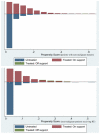Effect of radiotherapy on cardiac-specific death in patients with non-malignant tumors of central nervous system and related clinical features
- PMID: 36277796
- PMCID: PMC9582928
- DOI: 10.3389/fcvm.2022.991621
Effect of radiotherapy on cardiac-specific death in patients with non-malignant tumors of central nervous system and related clinical features
Abstract
Importance: Cardiac-specific death from radiation caused by radiation therapy (RT) in patients with malignant tumors has received extensive attention, however, little is known regarding the potential cardiotoxic effects of RT in patients with non-malignant tumors.
Objectives and methods: In this study, we used the SEER data to explore the incidence of post-radiation cardiovascular complications in patients with non-malignant tumors of central nervous system (CNS), and identify the influencing factors of cardiac-specific death.
Results: Ultimately 233, 306 patients were included (97.8% of patients had brain tumors and 2.2% had spinal cord tumors). For patients with non-malignant tumors of CNS, RT {yes (odds ratio [OR] 0.851, 95% confidence interval [CI] 0.774-0.936, p = 0.001, before propensity score matching (PSM); OR 0.792, 95% CI 0.702-0.894, p < 0.001, after PSM) vs. no} was associated with lower risk of cardiac-specific death, other clinical features affecting cardiac death similar to those in patients with non-malignant tumors of CNS receiving RT. For patients with non-malignant tumors of CNS receiving RT, female, married status, Hispanic ethnicity, surgery, and tumor site (brain exclude nerve and endocrine, nervous system) were associated with lower risks of cardiac-specific death, while earlier year of diagnosis, older age of diagnosis, Black, larger tumor and bilateral tumor were risk factors for cardiac-specific death.
Conclusions: Our study shows the influencing factors for cardiac-specific death in patients with non-malignant tumors of CNS, and found RT is associated with lower risk of cardiac-specific death. These results can facilitate the identification of patients with non-malignant tumors of CNS who can benefit from RT while avoiding cardiovascular events. In addition, this study helps to enhance the clinical use of RT in these populations, especially in patients who may have impaired cardiac function due to CNS tumors.
Keywords: benign tumors; borderline tumors; cardiac-specific death; central nervous system; non-malignant tumors; radiation therapy.
Copyright © 2022 Wang, Ye, Zhao, Ma, Wei, Wang, Zhang and Wang.
Conflict of interest statement
The authors declare that the research was conducted in the absence of any commercial or financial relationships that could be construed as a potential conflict of interest.
Figures
Similar articles
-
Effects of different types of radiation therapy on cardiac-specific death in patients with thyroid malignancy.Front Cardiovasc Med. 2022 Nov 10;9:996732. doi: 10.3389/fcvm.2022.996732. eCollection 2022. Front Cardiovasc Med. 2022. PMID: 36439994 Free PMC article.
-
CNS Tumors - clinical and radiological aspects.Cesk Patol. 2022 Fall;58(3):150-160. Cesk Patol. 2022. PMID: 36224037 English.
-
The role of adjuvant radiotherapy in patients with malignant phyllodes tumor of the breast: a propensity-score matching analysis.Breast Cancer. 2021 Jan;28(1):110-118. doi: 10.1007/s12282-020-01135-7. Epub 2020 Aug 3. Breast Cancer. 2021. PMID: 32748225 Free PMC article.
-
Central nervous system.Cancer Biomark. 2010;9(1-6):193-210. doi: 10.3233/CBM-2011-0177. Cancer Biomark. 2010. PMID: 22112477 Review.
-
Risk of secondary malignant neoplasms in children following proton therapy vs. photon therapy for primary CNS tumors: A systematic review and meta-analysis.Front Oncol. 2022 Aug 12;12:893855. doi: 10.3389/fonc.2022.893855. eCollection 2022. Front Oncol. 2022. PMID: 36033525 Free PMC article.
References
LinkOut - more resources
Full Text Sources
Miscellaneous




